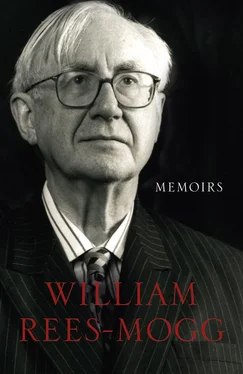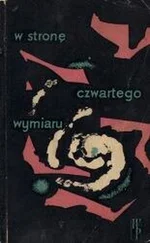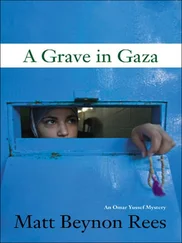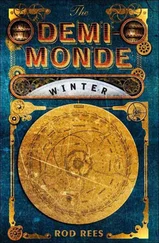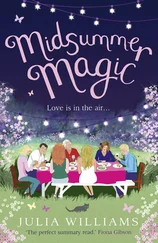A few days later we received a sympathetic letter from Lyttelton saying that I had not been awarded a scholarship. Everything therefore depended on the Charterhouse exam. Fifty years later my son, Jacob, who had himself gone to Eton, heard a somewhat different story from a visiting Eton master in Hong Kong.
By this account, the 1941 examination was the last time the Provost of Eton played a part in deciding who was to receive a scholarship. The provost was Lord Quickswood, earlier Lord Hugh Cecil, son of the Lord Salisbury who was Queen Victoria’s last Prime Minister. The provost, it is said, objected on quite other grounds. He did not take his stand on the fact that I knew little Latin and less Greek, true though that was. He argued that I should not have an Eton scholarship because I was a Roman Catholic. The examiners wanted to award a scholarship; the provost prevailed; no provost was ever again invited to join in the scholarship proceedings. No Roman Catholic was ever barred again.
In the meantime, my papers were written at Butcombe Court and sent to Charterhouse. They followed the same pattern; an excellent essay, good on history, weak in Latin and French, negligible in Greek and Mathematics. Indeed, in one mathematics paper I got three marks out of a hundred. I do not know why I was so bad at elementary mathematics since in my adult life I have used them more than most people do.
Robert Birley was the Headmaster of Charterhouse. The examiners spent the Friday discussing the various papers. They found it easy to award the first scholarship, which went to Simon Raven. They awarded ten others. They came to mine, and the weight of feeling was that my classics and maths were simply not up to scholarship standard. Birley, who was himself a historian, wanted to get a potential historian into the list. On Friday evening, he was not getting his own way. If they had decided then, I would not have got the scholarship.
Robert Birley was, however, a skilled chairman of a committee. He used a device which I remember using later on a critical occasion as Chairman of the Arts Council. Because he realized that he couldn’t get the decision he wanted, he postponed it. On the following day, the examiners met again. I was nodded through for the twelfth scholarship. When the telegram arrived I was delighted.
There is no doubt that Lord Quickswood’s intervention and Birley’s persuasiveness changed my life. I know that I would have enjoyed Eton, and would have been happy in Lyttelton’s House, possibly happier than I was at Charterhouse. Indeed, I might well have been too happy, too much of an Etonian; Charterhouse presented me with greater challenges. The difference extends beyond the schools themselves, to my Oxford life, to my career. If I had gone to Eton, I doubt if I would have gone on to Balliol; I might have opted for a more sympathetic political environment at Oxford. I would probably have found my political progress easier; there were plenty of Old Etonian chairmen of safe Conservative seats in the 1950s, though few are left now.
I am grateful to Charterhouse for many things. But I felt more at home at Eton, both in 1941 and later when my son Jacob was enjoying his time there. Perhaps the real advantage of going to Charterhouse was that it did not have the same dangerous charm for someone of my interests and personality. If I had entered the world of Eton, the world of Luxmore’s garden and the College Library, of the cricket fields, of Thomas Gray and Horace Walpole, I might well have found it too much of a lifelong lotus land. Cyril Connolly, with whom I was later to work on the Sunday Times , regarded nostalgia for Eton as one of ‘The Enemies of Promise’. It was so for him, it might well have been so for me. Jacob has become a loyal Old Etonian, and Eton suited him extremely well, but he did not become addicted to its ancient charm. For myself, I think Charterhouse was probably for the best, but there were aspects of Eton, including the personality of Lyttelton himself, a remarkable and scholarly housemaster, which I would clearly have enjoyed very greatly. In the words that Senator Bill Bradley used of basketball, Charterhouse did ‘teach me to use my elbows’.
Chapter Four
A Peak in Darien
As soon as I knew how to read, I delighted in reading. I still have the copy of H. G. Wells’ Outline of History which Anne bound in a canvas jacket in 1934. It is a chunky book, of some six hundred pages. I may never have finished it, but I waded through several hundred pages. My first fascination was with the dinosaurs, but I was also interested in history as such. Before reading Wells, I had read Our Island Story , which was very imperialist, and Dickens’ Child’s History of England , which was very Protestant. I responded to his account of the Reformation by becoming equally partisan on the Catholic side. It was the Catholic martyrs I cared about; Bloody Mary became Good Queen Mary. King Henry VIII I abominated, as I still do. For Queen Elizabeth I, I had mixed feelings.
Literature forms the architecture of the mind. Shakespeare came first, even before I could read. In the winter of 1931, my mother was reading Macbeth with my sisters. We were in the nursery at Cholwell, with a fire in the little Victorian stove. I was three and a half years old, and had not yet learned how to read.
To my sisters’ irritation, my mother insisted that I should join in the reading. She would read a line, and I would repeat it after her. My sisters felt that this procedure caused undue delay, and that Lady Macbeth was too substantial a part to be given to a three-year-old; they would then have been nine and ten years old.
I can remember moments of the reading. Most vividly, I remember the scene in Macduff’s castle, when Macbeth sends his murderers to kill Lady Macduff and their son. I was young enough to identify with the son. When the murderer calls his father a traitor, the boy has the splendid line: ‘Thou ly’st, thou shag-hair’d villain’. I liked that, and I admired the courage of his last words: ‘He has kill’d me, mother; run away, I pray you’.
However, most of the lines I remember from that first reading come from my own part, that is from Lady Macbeth herself. My sisters thought it comic when I repeated the lines:
I have given suck; and know
How tender ’tis to love the babe that milks me:
I would, while it was smiling in my face,
Have pluck’d my nipple from his boneless gums,
And dash’d the brains out, had I so sworn, as you
Have done in this.
I had to ask what the words ‘I have given suck’ meant, and remember my mother explaining to me about breastfeeding, a practice I had only abandoned some three years before.
In this speech, Lady Macbeth is spurring her husband on to the murder of the old King, Duncan. Macbeth interjects ‘If we should fail’ and receives the reply:
We fail.
But screw your courage to the sticking-place,
And we’ll not fail.
This led to a discussion of Lady Macbeth’s response. How did she say ‘We fail’? Was it scornfully, as though failure was impossible, or was it fatalistically, as a consequence to be faced? In 1915 as a young actress in Margaret Anglin’s company, my mother had discussed this point with old English actors in the cast. Beatrice herself was still a junior; Margaret Anglin was playing Lady Macbeth; Tyrone Power Senior was playing Macbeth; Tyrone Power Junior was being dandled on Beatrice’s knee, as his father learned his lines. Tyrone Power Senior always found it difficult to remember his lines, but, like his son, he was a fine figure of a man, in the old Irish style.
The English actors in the cast opted for the fatalistic reading ‘We fail’, which should be said with a falling tone in a matter-of-fact way. That, they had been told by old actors of their youth, was how Sarah Siddons had pronounced it, and she was the greatest Lady Macbeth the English stage could remember. So I played the line in the Sarah Siddons tradition. My sisters were much better than I was in the role of the witches, and danced gleefully around the nursery table.
Читать дальше
